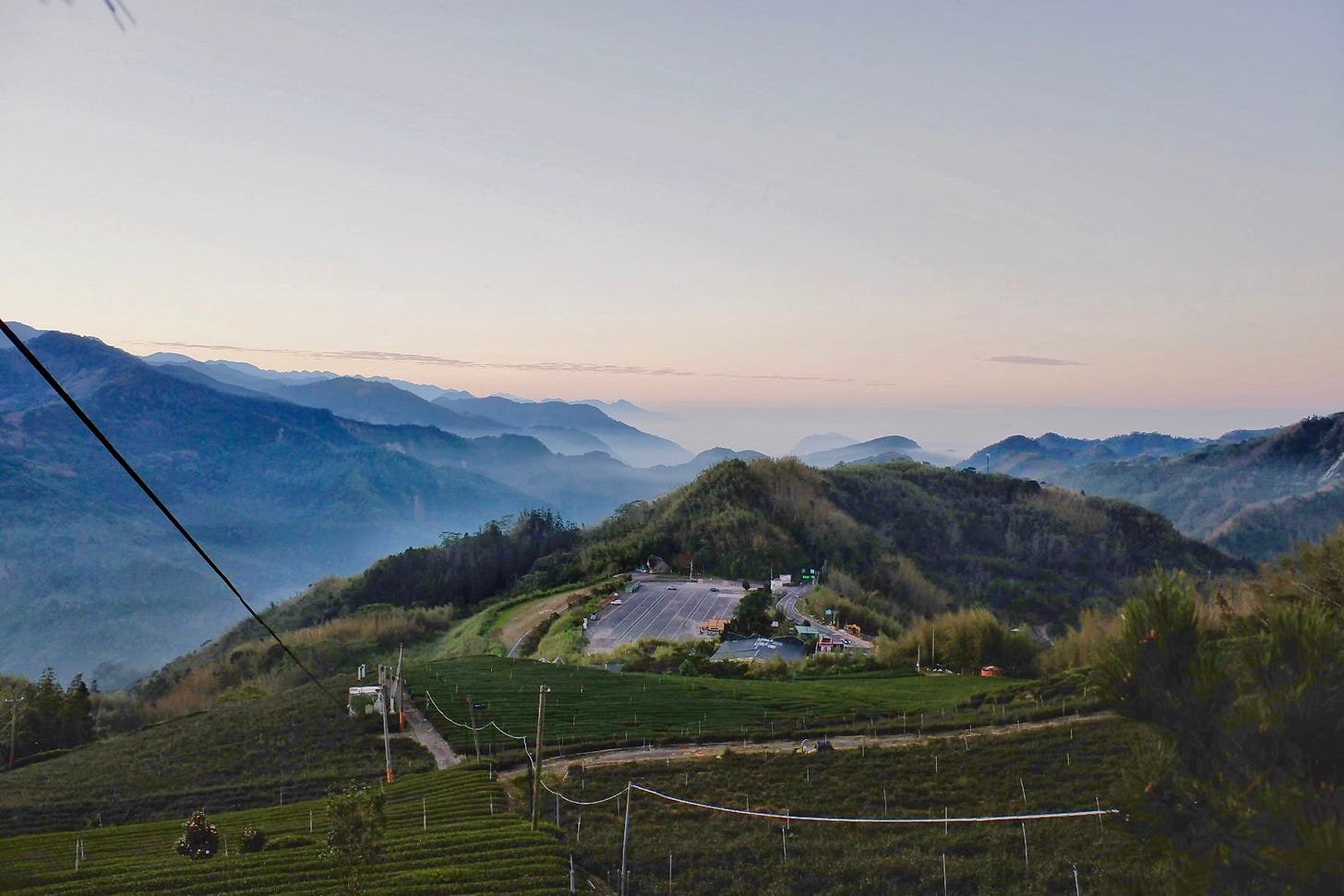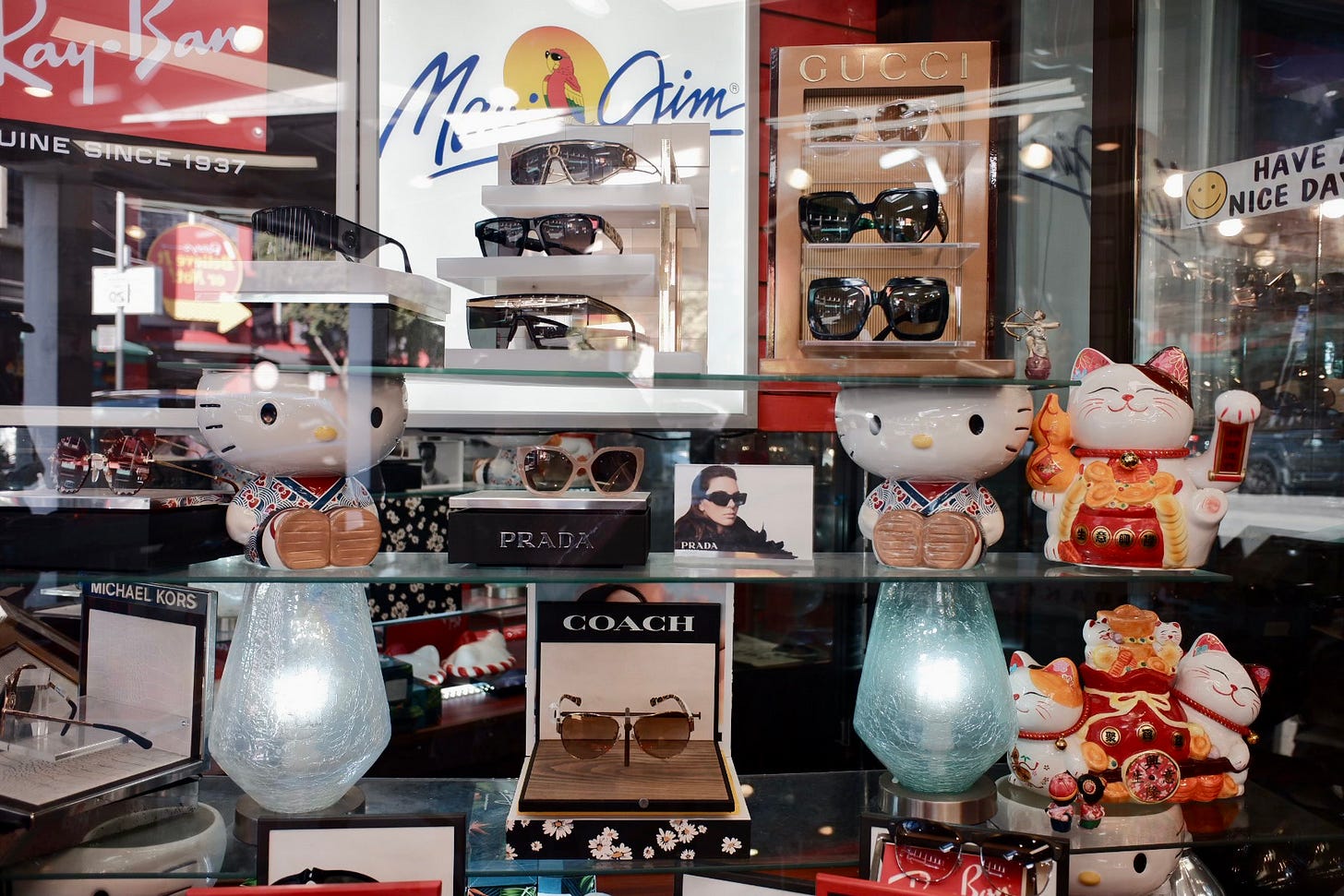color and perspective
a winter holidays travel special
Hello again and happy winter holidays to all those who celebrate! I’m breaking my previously unacknowledged, noncommital quarter-long streak of posting exactly once a month to deliver an extra end-of-year roundup. as usual, this is an amalgamation of a couple different threads that been running through in my head, loosely arranged around the chronology of my recent travels.
I recently traveled to Taiwan again, this time for vacation. although I’ve recently been feeling a bit of travel fatigue, I’m glad I went, because it was a very different experience the second time around. over the first few days, I managed to revisit some familiar haunts: popular shopping districts, the 象山 “trail” (really just a long set of stairs on a slope with some nice views of Taipei 101), and a bouldering gym in Zhongshan which I remember was extremely traumatizing the first time, partly because the setting is fairly technical and partly because I didn’t bring shoes but got dragged there anyway by some other grad students I knew. it was nice to be able to return during less busy hours to witness the results of my climbing progression.
A quirk of Chinese is that there are different words for vacationing and traveling for work: 旅游 (lv you) and 出差 (chu chai).1 the language clearly matters, because to my parents, the two are unambiguously distinct; to me, both are traveling. I’ve found both types of travel to be very fun and rewarding experiences, though admittedly for different reasons. for example, it turns out that you can see a lot more of your destination when you don’t have a conference to attend... shocking, I know.
This time around, I also managed to squeeze in a rushed tour of a couple nearby spots and scenic areas in central Taiwan, including a half-day in Jiufen and a loop through Taichung, Sun Moon Lake, and Alishan Scenic Area. although I didn’t have a lot of time to relax and take in the vibes, I was impressed by the colors and the atmosphere of these places. it reminded me of a very classic art internet topic centered around imitating the feeling of Studio Ghibli films by copying Miyazaki’s watercolor palette.2 although Jiufen is sometimes said to have served as inspiration for Spirited Away, the main comparison that came to mind for me was between the mountain locales and the settings of modern 武俠 (wuxia) and 仙侠 (xianxia) -ish television dramas. in particular, the sunrise near Alishan swept me away to 水云天, the 仙人 (fairy?) realm setting in Love Between Fairy and Devil, which I had previously believed to be a totally unrealistic product of CGI but turned out to in fact have some grounding in reality:
One thing I’m more conscious of recently when traveling outside the states is the scrutiny of my origins. before grad school, I had never really traveled internationally but always thought of my Chinese level as embarrassingly mediocre, very much 不及格 and unpassable anywhere outside the U.S. also, among my high school circle, my Mandarin pronunciation was fairly standard but my character comprehension extremely average. for reference, many of my friends regularly read novels in Chinese. it came as a genuine shock to meet ethnic Chinese people living in Asia and to hear their impression of children born and raised in the states as being completely illiterate in Chinese.
But I guess we all have various preconceptions, and not all of them are totally inaccurate. at our homestay in 石桌, one of the staff asked us where we were from. these days I’m used to the polite response of surprise and compliments on my Chinese, but the staff member offered another anecdote about another group of Americans who had stayed with them just a few days prior. for context, although it’s possible to rent a car in Taiwan, the roads are narrow and parking is limited, so most tourists (both domestic and international) instead rely on the remarkably robust Taiwan Tourist Shuttle system. even in the mountains where we were staying, these buses reliably hit the nearby stop every hour or so. to get from the homestay to a popular sightseeing spot nearby, it was a short fifteen minute bus ride. but like other Americans,3 this group must have been a bit insane, because they chose to wake up at 4am to hike the two hour foot route instead.
All of this to say that at the end of it all, I’m very grateful for the mix of Chinese and American ideals that I suffered through in my upbringing, as well as the specific combination of life experiences I’ve had which have colored my personal outlook on life. I’m sure this feeling is partially cognitive bias, but I genuinely can’t imagine any other setting which I’d rather have grown up in, or a different group of people I’d rather have around. in the future, I think I’ll probably cut down a bit on travel, but I’d like to more seriously work on my Chinese penmanship and vocabulary, and to continue to cultivate the diversity of relationships in my life.
Funny enough, 出差 also has another meaning in astronomy, which I discovered while writing this. I don’t know anything about the etymology of this phrase, but I guess it’s apt that it describes the effect of forces greater than oneself?
Although I’ve never gone through this exercise before (artist grade watercolors are expensive!), in high school I used a standard Holbein set which included Compose Blue and Permanent Green No. 1, which are two of the primary tones in Ghibli-style watercolor landscapes. overall, I remember liking the convenience of this set…
Not me though, I was way too tired




旅游 and 出差 » interesting, i assume it's not a case where there's a general "traveling" that kinda covers both